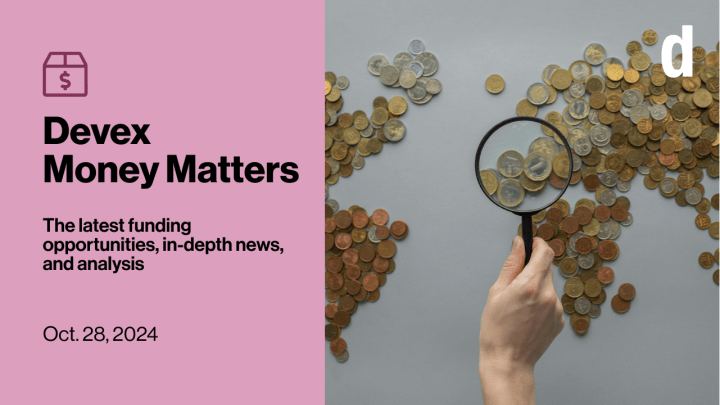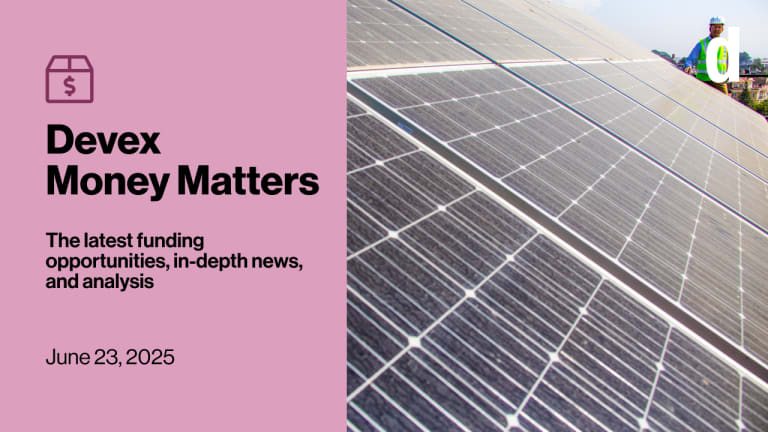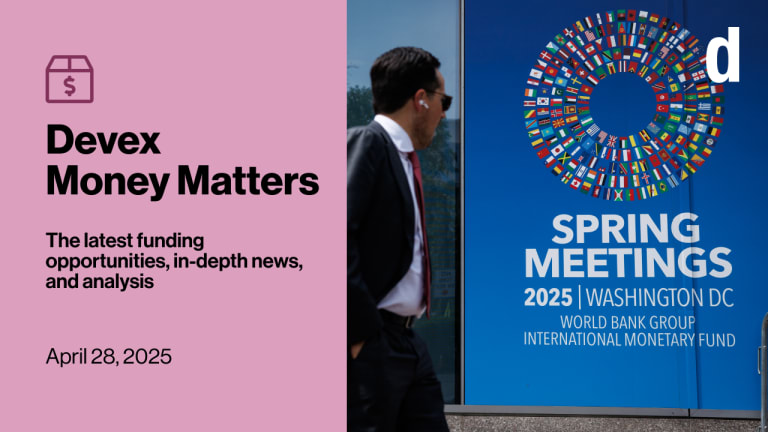
The impacts of the climate catastrophe aren’t equally distributed, and it is often the lowest-income countries that struggle the most. In an exclusive new report, Devex looks at the money needed to help those countries, and how much they’re currently receiving.
+ Are there topics you want to read more about in Money Matters? We want your feedback.
Climate shortfalls
The world is facing a climate crisis, but some countries are faring worse than others. In an attempt to understand where the impacts are falling — and where in the world the funding is being directed — Devex has produced a free-to-read report breaking down the situation in 10 of the world’s most vulnerable countries.
This is a preview of Devex Money Matters
Sign up to this weekly newsletter and get the latest in development funding in your inbox every Monday.
The report looks at which bilateral and multilateral donors are providing the most funding to each climate-vulnerable nation, what their biggest projects are, and how much the countries need to reach their climate goals in comparison to how much they are receiving.
The report also takes a country-by-country look at the barriers to tackling climate issues.
Read: The state of global climate financing
Funding activity
We publish tenders, grants, and other funding announcements on our Funding Platform. Here are some of the ones that have been viewed the most in the past 10 days.
The Asian Development Bank has approved a $241.3 million loan to improve electricity distribution in West Bengal, India.
The European Investment Bank and the European Commission announced a €117.35 million ($126.8 million) initiative for better water supply and management in the Caribbean.
The OPEC Fund for International Development signed a $392 million loan agreement to fund roadbuilding in Oman.
UNICEF is seeking a qualified institution to strengthen the capacity of WASH stakeholders in Kenya, Tanzania, Somalia, and Mozambique.
USAID intends to provide a $15 million grant to safeguard human rights and promote social inclusion in the Democratic Republic of Congo.
USAID has opened a $19 million grant competition to help foster the resilience of health systems in Peru.
+ Try out Devex Pro Funding today with a free five-day trial, and explore funding opportunities from over 850+ sources in addition to our analysis and news content.
USAID after the election
I was in Washington, D.C., last week for Devex World, our flagship conference. You’ll be able to check out everything that happened in a special newsletter that will be published on Wednesday, but for now let’s focus on the concluding session, which looked ahead to next week’s United States election and how the two political parties would take different approaches to USAID.
If Kamala Harris were to win, things would go on much as before, according to the political insiders on our panel. But USAID under the Republicans would be smaller. Climate and gender-based programs would likely take a hit, while faith-based organizations would see a boost.
Surprisingly, on the agency’s flagship policy of localization, we might see relatively little difference between the parties’ approaches, the speakers suggested. While the Democrats are committed to the idea for ideological reasons, the Republicans might see it as cost-effective.
Read: What the US election means for global development (Pro)
A week after the election, we’ll be gathering a panel of experts with hands-on experience in U.S. politics and aid to discuss the outcome and consequences for global development. Devex Pro members can sign up now. If you’re not a member yet, you can register for a free trial to join us.
World Bank news bank
Also in Washington last week, we had the annual meetings of the World Bank. As expected, the major discussions were around structural reform, IDA replenishment, and debt. But while a lot of ink was spilled on those subjects, and a lot of words were spoken on the stage, it’s not clear that there was any significant progress on them.
We’ve gathered all our coverage in one place for those who want to know all about what’s going on.
Read: All our coverage from the World Bank meetings
EU and you
Ask not what we can do for you, but what you can do for EU.
That’s the message from the European Union’s latest aid review, which takes a more nakedly self-interested approach to international development and promises to cut “less performant” countries out of the deal.
The new approach moves the focus toward the private sector, and toward countries that have stronger diplomatic links with Europe.
Read: Exclusive: EU to shun ‘less performant’ countries under new strategy (Pro)
Another one bites the dust
A few months after the demise of Crown Agents, another U.K. development organization has gone bust, albeit in fairly different circumstances.
Development Initiatives, which collects data on the aid sector, recently lost vital contracts as secretariat to the International Aid Transparency Initiative and as host of the Global Nutrition Report. Its “core grant” from the William and Flora Hewlett Foundation also came to an end.
Although it has received U.K. government funding, the Foreign, Commonwealth & Development Office cuts aren’t thought to be the major issue in this particular collapse.
Read: Development Initiatives, group using data to ‘end poverty,’ goes bust (Pro)
Interested in more business and funding coverage? Explore our business overview page. If you're a Pro subscriber, you can set up news alerts for funding articles. We suggest selecting "Funding" as the topic, along with keywords (e.g., USAID). Not a Pro subscriber yet? Try a 15-day Pro trial.
Sign up to Money Matters for an inside look at the biggest stories in development funding.




